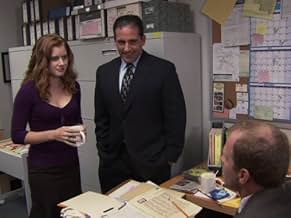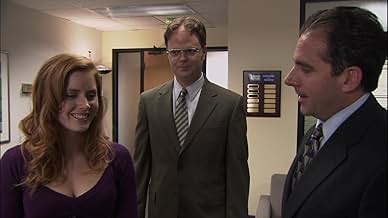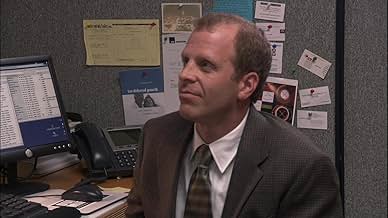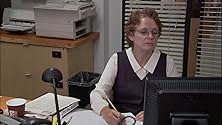Hot Girl
- Episode aired Apr 26, 2005
- TV-14
- 22m
IMDb RATING
7.5/10
9.2K
YOUR RATING
A traveling purse saleswoman catches Michael and Dwight's eye; Michael offers a ride in his convertible while Jim maneuvers closer to Pam, irking her fiancé Roy.A traveling purse saleswoman catches Michael and Dwight's eye; Michael offers a ride in his convertible while Jim maneuvers closer to Pam, irking her fiancé Roy.A traveling purse saleswoman catches Michael and Dwight's eye; Michael offers a ride in his convertible while Jim maneuvers closer to Pam, irking her fiancé Roy.
Melora Hardin
- Jan Levinson
- (voice)
Oscar Nuñez
- Oscar Martinez
- (as Oscar Nunez)
Mindy Kaling
- Kelly Kapoor
- (uncredited)
Featured reviews
Dwight is banging the purses against the table, because Jim told him that buying the purse.
A small branch of a stationary company in Pennsylvania is facing possible closure and redundancies and the staff aren't given a great deal of hope by having a bluffing clown of a boss in Michael Scott a man who wants to be popular more than a boss. As office politics play a part, the staff try to deal with this hanging over their heads as well as the usual ongoing petty nonsense that is part of any office life.
Adapting what is really a very British sitcom to be suitable for American tastes was never going to be easy and the first season of this show (which has grown in popularity) shows the problems right away. Season 1 is, for the most part, a straight reproduction of the original in terms of some of the stories but also very much the painful awkward feel of the whole thing. What this achieves is a quite funny sitcom because the material is pretty good but it falls down quite badly when it comes to the more painful part of the material which in the UK original was essentially the show. We all remember the original as hilarious but the truth is that much of it was funny while being unbearably awkward. This worked so well because the characters so totally sold it as real and you felt them dying inside as well as seeing them act awkward at that moment.
Here we have the conflicting aims of comedy and pain and the two don't sit well together. I got the sense that the US makers felt they wanted to do the UK version but that at the same time had a different vision for the show based on the US audience and also the different structure of the show (after all, the UK one was about 12 episodes total not quite what the US networks expect from their shows). Perhaps it is better if you have never seen the original but the conflict can be seen in many areas but most noticeably in two key characters - Brent/Scott and Jim/Tim. Scott is very much a comedian who tries too hard and frequently falls flat, looking trapped by his own attempts at being "cool. Brent was similar but his character was much more convincing and real a tiny man who one feels terrible pity for. Likewise Tim's pain and sense of being overwhelmed by the pointlessness of it all was palatable whereas Jim is far too perky and seems to be wearing it reasonably well.
Again this may be part of the longer game-plan as the development of characters over longer US seasons would be difficult if they arrived fully formed but it does the actors a bit of a disservice in this first season. Don't get me wrong though, the first season is still funny even when it comes over as a bit of a lesser copy, it does still generate laughs and awkwardness. However it is best when it is creating new material totally and worrying less about getting everything the same as the UK original. This is encouraging because, with 4 or 5 seasons now made, it is clear that it must have become its own master now given how little source material there is. Here though it must be said that it is impossible to avoid the US/UK comparison because it is writ large across almost all of the six episodes and, in attempting the same thing, the US version does fall short of the mark this is not protectionist sentiment, just the way it is.
The cast struggle by comparison because of the similarity. I think everyone is good enough to be able to raise their game when the show settles in but in this first season it is hard to avoid the sense of the cast not "getting it" in the way the original did. Again, I add the caveat of the longer game plan and the "pilot" nature of the first season but I cannot help say that Carell (who I like) is just not as good as Gervias at the pained stuff. He is at his best as the foolish clown but he cannot nail the inner emptiness and pathos that is what we all remember Brent for. Sadly the material makes this weakness more apparent. Wilson is a solid turn but again doesn't compare with the original. Krasinski offers more of a US sitcom role and I think will be good at this but again he struggles with trying to fit into the reproduced material while also having a less developed character. The only person of the whole cast who really nails the pained thing is Fischer as I totally believed the small deaths she suffered with every day in the office she is excellent here.
Season 1 is generally funny and, if I had not seen the original then I would probably have liked it more. However it stays too close to the original, suffering by comparison and also never finding its own voice or direction. I think the potential is there though and will follow this with season 2 to see where it goes and what it does when it has to start to find its own way.
Adapting what is really a very British sitcom to be suitable for American tastes was never going to be easy and the first season of this show (which has grown in popularity) shows the problems right away. Season 1 is, for the most part, a straight reproduction of the original in terms of some of the stories but also very much the painful awkward feel of the whole thing. What this achieves is a quite funny sitcom because the material is pretty good but it falls down quite badly when it comes to the more painful part of the material which in the UK original was essentially the show. We all remember the original as hilarious but the truth is that much of it was funny while being unbearably awkward. This worked so well because the characters so totally sold it as real and you felt them dying inside as well as seeing them act awkward at that moment.
Here we have the conflicting aims of comedy and pain and the two don't sit well together. I got the sense that the US makers felt they wanted to do the UK version but that at the same time had a different vision for the show based on the US audience and also the different structure of the show (after all, the UK one was about 12 episodes total not quite what the US networks expect from their shows). Perhaps it is better if you have never seen the original but the conflict can be seen in many areas but most noticeably in two key characters - Brent/Scott and Jim/Tim. Scott is very much a comedian who tries too hard and frequently falls flat, looking trapped by his own attempts at being "cool. Brent was similar but his character was much more convincing and real a tiny man who one feels terrible pity for. Likewise Tim's pain and sense of being overwhelmed by the pointlessness of it all was palatable whereas Jim is far too perky and seems to be wearing it reasonably well.
Again this may be part of the longer game-plan as the development of characters over longer US seasons would be difficult if they arrived fully formed but it does the actors a bit of a disservice in this first season. Don't get me wrong though, the first season is still funny even when it comes over as a bit of a lesser copy, it does still generate laughs and awkwardness. However it is best when it is creating new material totally and worrying less about getting everything the same as the UK original. This is encouraging because, with 4 or 5 seasons now made, it is clear that it must have become its own master now given how little source material there is. Here though it must be said that it is impossible to avoid the US/UK comparison because it is writ large across almost all of the six episodes and, in attempting the same thing, the US version does fall short of the mark this is not protectionist sentiment, just the way it is.
The cast struggle by comparison because of the similarity. I think everyone is good enough to be able to raise their game when the show settles in but in this first season it is hard to avoid the sense of the cast not "getting it" in the way the original did. Again, I add the caveat of the longer game plan and the "pilot" nature of the first season but I cannot help say that Carell (who I like) is just not as good as Gervias at the pained stuff. He is at his best as the foolish clown but he cannot nail the inner emptiness and pathos that is what we all remember Brent for. Sadly the material makes this weakness more apparent. Wilson is a solid turn but again doesn't compare with the original. Krasinski offers more of a US sitcom role and I think will be good at this but again he struggles with trying to fit into the reproduced material while also having a less developed character. The only person of the whole cast who really nails the pained thing is Fischer as I totally believed the small deaths she suffered with every day in the office she is excellent here.
Season 1 is generally funny and, if I had not seen the original then I would probably have liked it more. However it stays too close to the original, suffering by comparison and also never finding its own voice or direction. I think the potential is there though and will follow this with season 2 to see where it goes and what it does when it has to start to find its own way.
For me it was just a lack of creation and this episode felt just been here to fill air-time on TV, nothing too special, nothing serious just giggles, I expect more to be honest.
For the past few years, I considered the TV series "Family Guy" to be the funniest show on the tube for its ability to poke fun at anything and everything. Yet, more than likely due to the rather sick mind of creator Seth McFarlane, that show tends to beat you over the head (sometimes again and again and again) with its jokes in rather crude fashion. It can be hilarious, don't get me wrong, but a show like that can only stay fresh for so long without having to up the "shock ante" with every episode.
Just recently, though, I discovered "The Office" while utilizing a free trial of Netflix and was blown away by the subtleness of the humor that abounds in each and every episode. I had watched bits and pieces of certain episodes in the past, but beginning to watch them in broadcast order really helped me put the pieces together and enjoy every second of each 20-minute episode.
Basically, the show is set at the Dunder-Mifflin paper company in Scranton, PA, where a very diverse group of office workers work the 9-5 cubicle life under the "direction" of Michael Scott (played by Steve Carell). It's very much like a toned-down, more realistically-funny version of the feature film "Office Space". But here's the catch: Michael is, by and large, a complete idiot, and thus the office functions accordingly.
In this first season (only six episodes long, likely due to its "trial run" status in the U.S. to see if it could duplicate the success of its United Kingdom namesake show), all the building blocks of the show are put in place in terms of character development, relationships, and humor. Really, there are three reasons why the show (right from this very first season) resonated so much with American audiences:
First, is the notion that all the characters are so relatable to potential real-life situations. Everyone can relate to the idiot boss (Michael), the office suck-up (Dwight), the "normal" or "cool" ones (Jim and Pam), the pervert (Kevin) and the tightly-wound frosty woman (Angela), to name just a few. While those characters are of course amped up a bit from what a real office feels like, there still exists that sense that you yourself could just as easily be in the same situation they are.
Another reason this show is so successful is the focus on the characters of Jim and Pam. Both are acted extraordinarily by John Krasinski and Jenna Fischer and are truly the heart and soul of the show. Audiences can easily relate to the romantic tension and silly pranks between the two because of what could be called a "normalcy complex": they are the two most normal, fun characters on the show, and thus the audience roots for them due to the fact that they represent what we want to be at work. Your heart will break as they both struggle to figure out a relationship that seems destined to be, but at the same time you will also laugh along with them as they pull their silly pranks on various office personnel.
Finally, though, what truly sets this show apart from any other comedy series I have previously seen is the fact that storylines are progressed from episode to episode. Unlike some half-hour comedies (like Family Guy) where, by and large, the slate is pretty much wiped clean after every episode, "The Office" instead builds on certain plot and character threads to create continuity. Thus, the characters actually grow and learn on screen in front of you, so to speak, and don't just stagnate repeating the same old jokes or gags.
Thus, I would pretty much recommend this show to anybody who has ever held a job (not too limiting, huh?!), as you will be able to instantly relate to the kind of antics that transpire.
Just recently, though, I discovered "The Office" while utilizing a free trial of Netflix and was blown away by the subtleness of the humor that abounds in each and every episode. I had watched bits and pieces of certain episodes in the past, but beginning to watch them in broadcast order really helped me put the pieces together and enjoy every second of each 20-minute episode.
Basically, the show is set at the Dunder-Mifflin paper company in Scranton, PA, where a very diverse group of office workers work the 9-5 cubicle life under the "direction" of Michael Scott (played by Steve Carell). It's very much like a toned-down, more realistically-funny version of the feature film "Office Space". But here's the catch: Michael is, by and large, a complete idiot, and thus the office functions accordingly.
In this first season (only six episodes long, likely due to its "trial run" status in the U.S. to see if it could duplicate the success of its United Kingdom namesake show), all the building blocks of the show are put in place in terms of character development, relationships, and humor. Really, there are three reasons why the show (right from this very first season) resonated so much with American audiences:
First, is the notion that all the characters are so relatable to potential real-life situations. Everyone can relate to the idiot boss (Michael), the office suck-up (Dwight), the "normal" or "cool" ones (Jim and Pam), the pervert (Kevin) and the tightly-wound frosty woman (Angela), to name just a few. While those characters are of course amped up a bit from what a real office feels like, there still exists that sense that you yourself could just as easily be in the same situation they are.
Another reason this show is so successful is the focus on the characters of Jim and Pam. Both are acted extraordinarily by John Krasinski and Jenna Fischer and are truly the heart and soul of the show. Audiences can easily relate to the romantic tension and silly pranks between the two because of what could be called a "normalcy complex": they are the two most normal, fun characters on the show, and thus the audience roots for them due to the fact that they represent what we want to be at work. Your heart will break as they both struggle to figure out a relationship that seems destined to be, but at the same time you will also laugh along with them as they pull their silly pranks on various office personnel.
Finally, though, what truly sets this show apart from any other comedy series I have previously seen is the fact that storylines are progressed from episode to episode. Unlike some half-hour comedies (like Family Guy) where, by and large, the slate is pretty much wiped clean after every episode, "The Office" instead builds on certain plot and character threads to create continuity. Thus, the characters actually grow and learn on screen in front of you, so to speak, and don't just stagnate repeating the same old jokes or gags.
Thus, I would pretty much recommend this show to anybody who has ever held a job (not too limiting, huh?!), as you will be able to instantly relate to the kind of antics that transpire.
Most people argue that the first season of the Americanized Office was too similar to the British original (and it certainly applies to the pilot episode, which was co-written by Ricky Gervais, Stephen Merchant and US developer Greg Daniels), most notably in the number of episodes in the first season: just six, like a standard UK sitcom. However, the reduced episode order was probably due to simple caution on the part of NBC, who wanted to check if American audiences would respond to the series before requesting a standard-length season.
Funny coincidences aside, Hot Girl is a very amusing season finale, in which most of the male staff go "crazy" when an attractive saleswoman (Amy Adams) shows up in the Dunder Mifflin building. Michael and Dwight make fools of themselves immediately, Roy makes an inappropriate comment in Pam's presence and Jim... well, he doesn't have any problems, really.
While not exactly setting up a second season, Hot Girl works admirably as a finale, reminding us why The Office is such a terrific show with some priceless displays of awkward comedy (anything Dwight says) and pure laughs (Ryan washing Michael's car: genius). A frustratingly short first year, no doubt, but with hindsight a juicy appetizer for what came next: one of the greatest comedy shows on television.
Funny coincidences aside, Hot Girl is a very amusing season finale, in which most of the male staff go "crazy" when an attractive saleswoman (Amy Adams) shows up in the Dunder Mifflin building. Michael and Dwight make fools of themselves immediately, Roy makes an inappropriate comment in Pam's presence and Jim... well, he doesn't have any problems, really.
While not exactly setting up a second season, Hot Girl works admirably as a finale, reminding us why The Office is such a terrific show with some priceless displays of awkward comedy (anything Dwight says) and pure laughs (Ryan washing Michael's car: genius). A frustratingly short first year, no doubt, but with hindsight a juicy appetizer for what came next: one of the greatest comedy shows on television.
Did you know
- TriviaThis is the first episode written by writer and actor Mindy Kaling, who plays Kelly Kapoor.
- Alternate versionsThis episode has an extended cut version released under The Office: Superfan Episodes.
- ConnectionsFeatured in The Office: The Banker (2010)
Details
Contribute to this page
Suggest an edit or add missing content
























